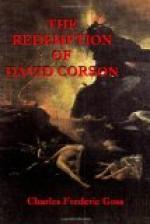“Perdita!” exclaimed the gypsy, taken completely off his guard.
“Lost indeed,” responded the quack, scarcely able to conceal his pride in his own astuteness. And then he added slowly: “She must be a burden to you, Baltasar. You evidently never have been able or never have dared to take her back and claim the ransom which you expected. I will pay you for her and take her from your hands. It is the child I want and not vengeance.”
“Ze Caballero muz be a Duquende (spirit),” gasped the gypsy.
“At any rate I want the child. You were reasonable about the horse. Be reasonable about her, and all will be well.”
“Ze Caballero muz be made of gol’.”
The horseman drew a silver coin from his pocket and flipped it into the waters of the brook.
The gypsy’s face gleamed with avarice and springing into the water he began to scrape among the stones where it had fallen.
The stranger watched him for awhile with an expression of mingled amusement and contempt, and finally said: “Baltasar, I am in haste. You can search for that trifle after I am gone. Let us finish our business. What will you take for the girl?”
Still standing in the water, which he seemed reluctant to leave, he shrugged his shoulders and replied: “We muz azk Chicarona. Zhe eez my vife.”
“And master?” asked the quack, smiling sardonically.
The gypsy did not answer, but, stepping from the brook and looking backward, reluctantly led the way to the tent.
“Chicarona! Chicarona!” he cried as they approached it.
The flap of the tent was thrown suddenly backward, and three figures emerged—a tall and stately woman, a little elfish child; and an old hag, wrinkled, toothless and bent with the weight of unrecorded years. The woman was the mother of the little child and the daughter of the old hag.
“Chicarona,” said the gypsy, “ze Gacho az byed ze ztallion for zwo hunner an’ viftee dollars, an’ now he wanz to buy Pepeeta.”
“Wad vor?” she asked.
“Berhabs he zinkz zhe eez a prinzez, I dunno,” he answered, digging the toe of his bare foot nervously into the sand.
“Zen dell ’im zat he zhold not look vor ztrawberries in ze zea, nor red herring in ze wood,” she said with a look of scorn.
The eyes of the stranger and the gypsy met. They confronted each other like two savage beasts who have met on a narrow path and are about to fight for its possession. It was not an unequal match. The man’s eyes regarded the woman with a proud and masterful determination. The woman’s seemed to burn their way into the inmost secrets of the man’s soul.
Chicarona was a remarkable character. In her majestic personality, the virtues and the vices of the Spanish Gypsy fortune-teller were incarnate. The vices were legion; the virtues were two—the love of kindred, and physical chastity—the chastity of the soul itself being unknown.




